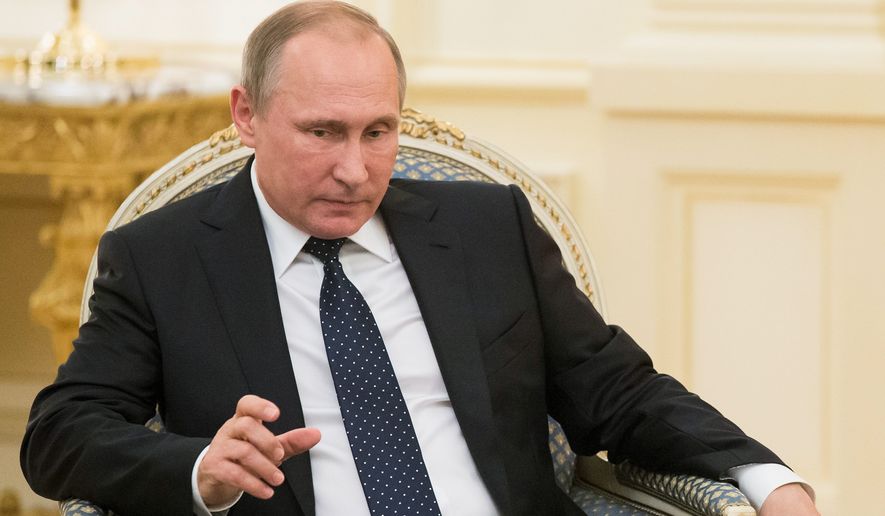Rumblings from Russian President Vladimir Putin and other top Moscow officials during recent days have set off new fears that the frozen conflict in Ukraine could be on the verge of dramatically heating up again.
Russian Foreign Minister Sergey Lavrov said Monday that Moscow still hopes to pursue a final peace deal with Kiev but warned that Russia intends to take “comprehensive measures” to prevent Ukraine’s military from attacking the Crimean Peninsula.
The comments marked the latest in a flurry of sharp posturing from Moscow. Last week, Mr. Putin made headlines by accusing Ukraine of trying to provoke a conflict over Crimea, which Russia annexed in 2014 after its forces invaded and occupied the peninsula.
The U.S. and other Western nations have refused to recognize the seizure and imposed punishing economic sanctions on Russia.
But a string of Russian moves and statements has many in Ukraine worried that Mr. Putin is preparing the ground and seeking a pretext for another military action against the former Soviet republic.
After summoning his security council for a special meeting Wednesday, Mr. Putin offered some of his most aggressive rhetoric against Kiev since the height of the war between Moscow-backed separatists and Ukrainian forces in eastern Ukraine in 2014 and 2015.
With Russia’s FSB security service saying one of its officers and a Russian soldier were killed by Ukrainian “saboteurs” in Crimea, Mr. Putin accused Kiev of sending military intelligence agents into the Russian-held peninsula to carry out terrorist attacks.
The Kremlin then revealed its plans to beef up the number of troops it has stationed in Ukraine. The Russian Defense Ministry — whose Black Sea Fleet is based in Crimea — said the Russian navy will engage in exercises in the area to practice repelling underwater attacks by saboteurs, which some in Ukraine fear could be a prelude to another invasion.
Sporadic violence between government forces and pro-Russian separatists has continued to rage in eastern Ukraine’s Donbass region. On July 19, Kiev said seven of its soldiers were killed and 14 wounded in the bloodiest clashes in months.
The Obama administration and Western European powers have been pressuring officials in Moscow and Kiev to abide by the Minsk Agreement, which Russia, Ukraine, Germany and France signed in the Belarus capital in February 2015.
Secretary of State John F. Kerry sought to give the agreement new momentum during a visit to Russia in mid-July, but the Obama administration has focused more in recent days on finding a way to work with Russia in the Syrian civil war.
State Department spokeswoman Elizabeth Trudeau, asked about the escalating rhetoric from Russia on Ukraine, called on both sides to reduce tension and refrain from heated rhetoric.
Heavily armed divide
But neither Kiev nor the insurgents in Eastern Ukraine appear to be listening. Monitors from the Organization for Security and Cooperation in Europe say neither side has withdrawn its heaviest weapons from the front line — one of the first points of the Minsk deal.
Ukraine’s ambassador to the United Nations, Volodymyr Yelchenko, said Russia has amassed more than 40,000 troops in the region and warned that another buildup could reflect “very bad intentions.”
Some analysts say Ukraine and Russia may be exaggerating the severity of the situation in the interest of renewing American and Western European attention to the region.
Paul Quinn-Judge, the senior Europe and Central Asia program adviser with the International Crisis Group, said it’s not clear whether Moscow’s latest outburst signals a push by officials around Mr. Putin for a new wave of aggression against Ukraine.
What is clear, Mr. Quinn-Judge argued in a post on the International Crisis Group’s website Friday, is that “Russia is intensely frustrated by the lack of movement on the February 2015 Minsk agreement, and has sought to put the onus for the lack of progress on Ukraine.
“The agreement, which imposed on Kiev a major military defeat at the hands of Russian and separatist forces, is highly disadvantageous for Ukraine,” he wrote. It may prove politically fatal for Ukrainian President Petro Poroshenko, who is seen to be delaying its implementation as much as possible.
“In response, Moscow is turning up the heat. It is trying to remind Kiev of the damage its forces could inflict on Ukraine, to force Kiev’s Western backers to move on Minsk,” Mr. Quinn-Judge wrote.
Mr. Lavrov on Monday offered a similarly mixed message on Ukraine after meeting with German Foreign Minister Frank-Walter Steinmeier in Moscow. The Russian minister said Moscow has no intention of severing diplomatic ties with Kiev and that Russia will play its part in ensuring that the Minsk Agreement is honored.
But Mr. Lavrov also made it clear that Russia had no intention of dropping accusations that it caught Ukrainians planning a bombing campaign inside Crimea.
Moscow will take “comprehensive measures to make sure any attempts to make incursions into our territory are nipped in the bud,” he said.
But some in Ukraine say Mr. Putin may be looking at another date — the Sept. 18 parliamentary elections in Russia — and the need to build up his government’s support in polls.
“Putin needs a nice, small, victorious war,” Alexey Arestovych, a former Ukrainian intelligence officer and now independent military analyst, told the Voice of America.
• This article is based in part on wire service reports.
• Guy Taylor can be reached at gtaylor@washingtontimes.com.




Please read our comment policy before commenting.